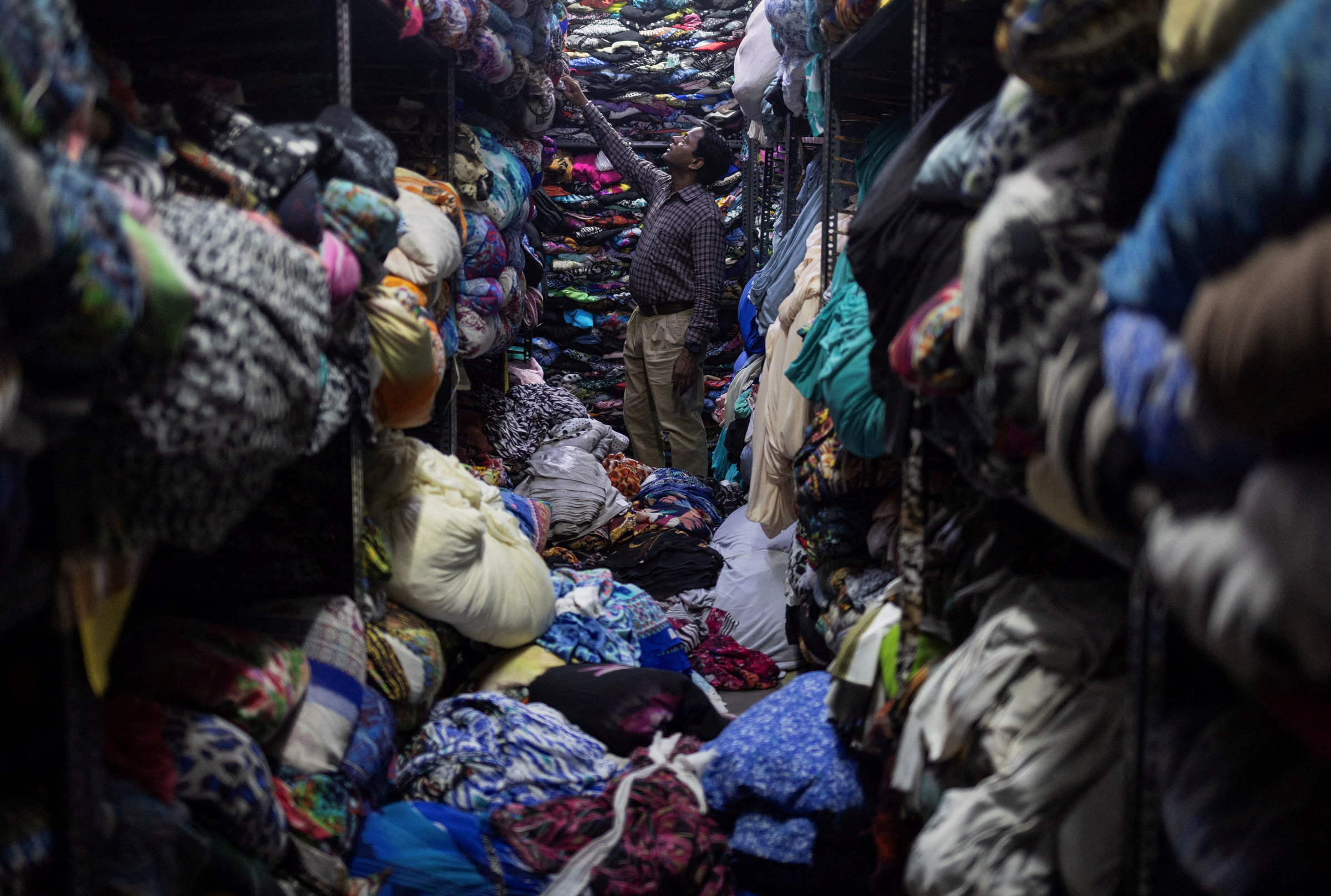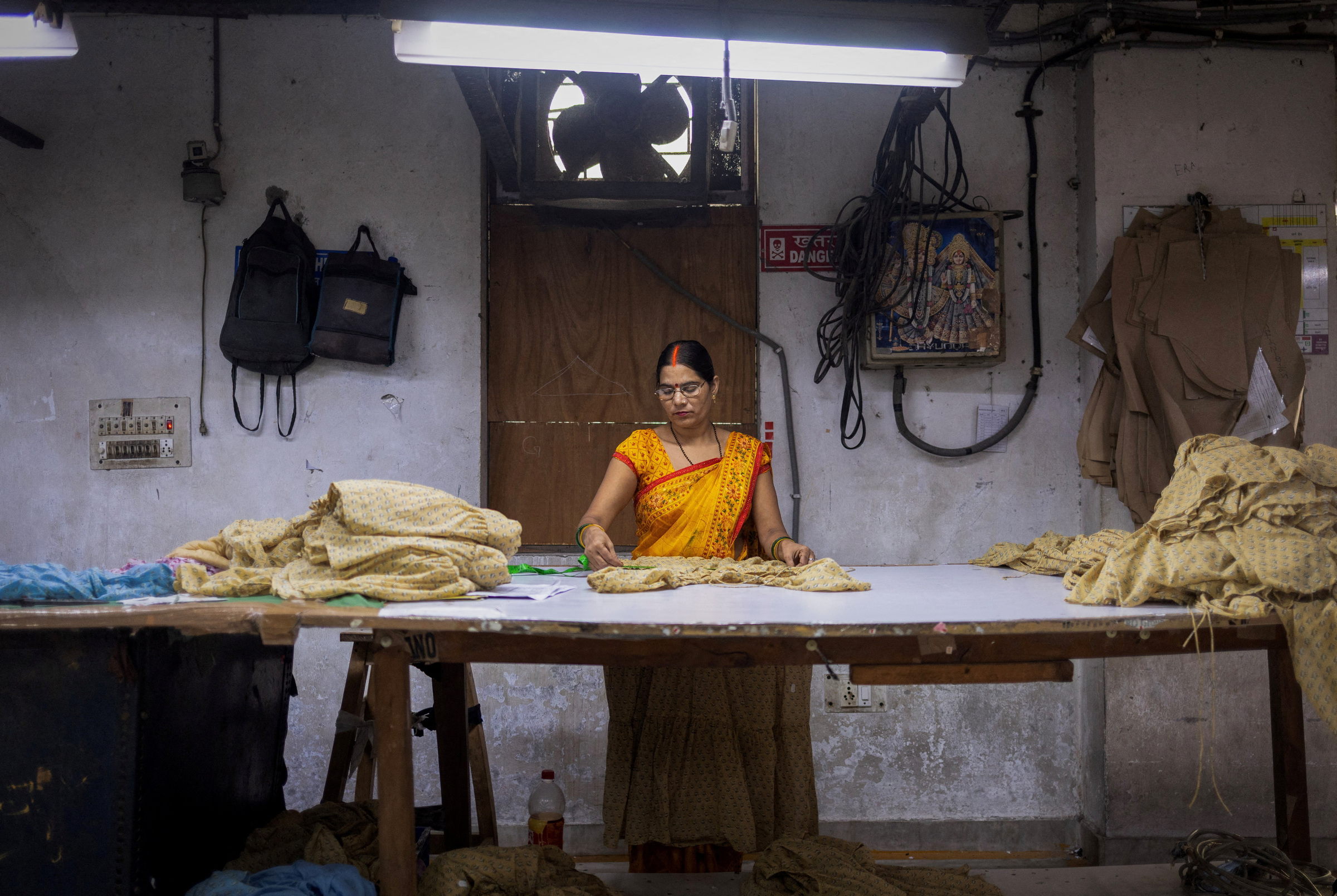In a sprawling market in New Delhi, India, Anuj Gupta sits in the corner of his shop, enveloped in silence. He sources and exports garment accessories, like lace and buttons, for major global brands. But the punitive tariffs imposed by former US President Donald Trump on Indian goods have brought Gupta's operations to a near standstill.
 |
A worker searches for fabric to make clothes at a garment factory in Noida, India, on 7/8. Photo: Reuters |
A worker searches for fabric to make clothes at a garment factory in Noida, India, on 7/8. Photo: Reuters
On 27/8, the 50% US tariffs on Indian imports took effect, fulfilling President Trump's threat to double the existing 25% levy. The increase was a response to India's purchase of Russian oil, which the Trump administration viewed as indirectly funding Russia's campaign in Ukraine. Indian officials accused the US of double standards, pointing out that the European Union and China purchased even more Russian oil, and that Washington itself continued to trade with Moscow.
Gupta explained that in the fashion industry, production cycles typically run a year in advance, meaning clothes are currently being designed and manufactured for the fall of 2026. The market uncertainty has "severely hampered" business, leaving "a huge void," he said. Gupta exports 40% of his goods to the US market.
Until the morning of 27/8, he held onto hope. "Maybe Trump is just bluffing, or Prime Minister Modi's good relationship with the US will salvage the situation," Gupta said. "But we're the ones being treated badly."
Five rounds of negotiations failed to yield any trade agreement between Washington and New Delhi. Gupta said exporters now fear their customers might be forced to abandon India. "If the tension persists, buyers will seek other markets to replace us," he added.
Analysts and economists suggest the tariffs could devastate India's export-driven economic sectors, leading to hundreds of thousands of job losses.
Ajay Sahai, CEO of the Federation of Indian Export Organisations (FIEO), expressed cautious optimism about potential government assistance following a meeting with Finance Minister Nirmala Sitharaman on 28/8.
"The government assured us they would provide all necessary support to address this issue, possibly including an economic stimulus package," he said. "They asked us to prepare a report, after which they will formulate a plan. Sitharaman pledged there wouldn't be mass layoffs, and that's what we should believe."
However, the current situation is particularly challenging for Indian businesses. Textiles, gems, jewelry, carpets, and shrimp are among India's largest exports to the US and are expected to be hit hardest by the tariffs.
K Anand Kumar, manager of shrimp exporting company Sandhya Marines, which employs nearly 3,500 workers in a coastal town in Andhra Pradesh on the Bay of Bengal, said his business is on the brink of collapse.
Over 90% of his company's shipments go to the US. Last year, India exported a record 1.78 million tons of seafood to the US, worth 7.38 billion USD. Shrimp was the dominant product, contributing 92% of the total value.
"The shrimp industry is a labor-intensive sector," said Kumar, who also heads the seafood exporters association branch in Andhra Pradesh. He estimated the Indian shrimp export industry employs nearly two million workers, and over 50% of them will be directly affected by President Trump's tariffs.
"We are laying off employees because we can't continue paying wages without any orders," Kumar said. "Farmers and shrimp peelers will be the hardest hit."
Export associations estimate the tariffs could impact nearly 55% of India's 87 billion USD worth of exports to the US, giving an advantage to competitors facing lower tariffs.
 |
Workers measure fabric to prepare for dressmaking at a garment factory in Noida, India, on 7/8. Photo: Reuters |
Workers measure fabric to prepare for dressmaking at a garment factory in Noida, India, on 7/8. Photo: Reuters
Moody's Ratings warned that President Trump's tariffs could slow India's economic growth, severely limiting its manufacturing ambitions and potentially reversing some of the gains India has made in recent years in attracting investment.
"It's like a nightmare where you don't know what new tariff you'll wake up to," Kumar said.
Kumar added that he has never encountered such a crisis in his 30 years of doing business with the US. "The US is playing games with us, doing whatever they want," he said. "We have to adapt, but it feels so helpless."
Nearly 1,000 km from Kumar's factory, fear grips Tiruppur, a town in the southern state of Tamil Nadu, the heart of India's garment export industry.
Situated on the banks of the Noyyal River and nestled against rocky hills, Tiruppur contributes almost one-third of India's total 16 billion USD ready-made garment exports. It's known as "Dollar City" due to its primary income source. Numerous leading global fashion brands source their products from Tiruppur.
While higher profits from major brands offer some businesses a temporary reprieve, a prolonged crisis could cripple them, said V Elangovan, CEO of garment exporting company SNQS International Group.
"In places with low-profit margins, production has completely stopped," he said. Elangovan's company employs 1,500 workers. He said around 150,000 workers in Tiruppur are at risk of losing their jobs due to US tariffs.
"It's very difficult to find new customers in this economy," he said. "Customer diversification isn't like a switch we can turn on and off at will. Soon, we'll face cash flow problems, and many workers will be laid off."
Meanwhile, Prime Minister Modi remains firm in his stance on the trade war with the US. "India needs to become self-reliant. Economic selfishness is increasing globally, and we cannot afford to sit and lament our difficulties," he said on 15/8.
The Prime Minister affirmed that India "will stand as a wall against any policy that threatens its interests." "India will never compromise on protecting the interests of its farmers," he emphasized, indirectly addressing the sticking points in trade negotiations with the US, which seeks greater access to India's agricultural and dairy markets. Nearly 50% of India's 1.4 billion population relies on agriculture for their livelihood.
However, traders and business owners fear they could suffer heavy losses in this bargain. "The 50% tariff is practically an embargo on Indian goods," Elangovan said.
Vu Hoang (Al Jazeera, AFP, Reuters)












